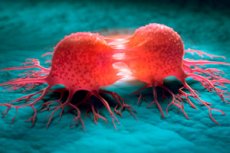New publications
The drug reprograms macrophages and inhibits the growth of prostate and bladder tumors
Last reviewed: 02.07.2025

All iLive content is medically reviewed or fact checked to ensure as much factual accuracy as possible.
We have strict sourcing guidelines and only link to reputable media sites, academic research institutions and, whenever possible, medically peer reviewed studies. Note that the numbers in parentheses ([1], [2], etc.) are clickable links to these studies.
If you feel that any of our content is inaccurate, out-of-date, or otherwise questionable, please select it and press Ctrl + Enter.

A new therapy that reprograms immune cells to boost anti-tumor activity has helped shrink hard-to-treat prostate and bladder tumors in mice, according to a discovery by scientists at the Johns Hopkins Kimmel Cancer Center and Bloomberg Kimmel Institute for Cancer Immunotherapy, as well as the Johns Hopkins Drug Discovery Research Group.
Immunotherapies, which help the immune system recognize and fight tumors, have revolutionized the treatment of many types of cancer. However, these therapies, which boost the production and activation of tumor-killing T cells, have not been effective against aggressive forms of prostate and bladder cancer.
The field of oncology has long struggled to understand why immunotherapies don’t work effectively against these cancers and how to improve their performance. The study’s senior author, Jelani Zarif, PhD, a professor of oncology at Johns Hopkins, and his colleagues suspected that immune cells called macrophages were to blame. In some conditions, macrophages help tumors grow and suppress the activity of T cells, weakening the immune response to cancer.
"The focus of our work is to reprogram immune-suppressing tumor-associated macrophages into immune cells that stimulate an anti-tumor response to improve therapeutic responses to immunotherapies and other standard cancer treatments," says Zarif.
Immune-suppressing macrophages depend on the amino acid glutamine. Zarif and his colleagues previously showed that macrophage precursors called monocytes develop into immune-activating macrophages when they are grown in the lab without glutamine. In contrast, when monocytes are grown with glutamine, they become immune-suppressing macrophages.
Zarif and his team hypothesized that drugs that blocked immune cells’ access to glutamine would shift the balance of macrophages toward the immune-stimulatory type and help shrink tumors. Research has shown that a drug called 6-diazo-5-oxo-L-norleucine (DON), which deprives tumors of glutamine, shrinks tumors that depend on glutamine to grow. However, development of the drug as a cancer therapy was halted decades ago because of its gastrointestinal toxicity and harmful side effects.
Instead, Zarif used an experimental glutamine-blocking drug developed by study co-authors Barbara Slusher, PhD, director of the Johns Hopkins Drug Discovery Research Group, and Jonathan Powell, MD, former associate director of the Bloomberg-Kimmel Institute for Cancer Immunotherapy. The drug, JHU083, is a type of molecule called a prodrug that cells inside the body turn into an active drug.
Specifically, JHU083 can convert to its active, glutamine-blocking form only inside a tumor, preventing harmful side effects elsewhere in the body. Studies show the drug shrinks tumors, reduces the spread of cancer, and increases survival in animals with skin, colon, blood, and brain cancers, as well as some hard-to-treat forms of breast cancer.
"Barbara Slusher and her team have altered the chemistry of the drug so that it circulates inactively throughout the body and is activated only when it hits cancer cells," explains Zarif. "Because the active form is released only in cancer cells, lower doses can be given, further reducing the risk of side effects."
Zarif and his colleagues showed that JHU083 blocked glutamine use in prostate and bladder tumors in mice, reducing tumor growth and causing tumor cell death. It also reprogrammed immune-suppressing macrophages into immune-stimulating macrophages. The macrophages themselves began to destroy tumor cells. They also helped recruit T cells and natural killer cells to the tumors.
Adding an immunotherapy called a checkpoint inhibitor, which boosts T-cell activation in tumors, did not increase JHU083’s effects. Zarif explained that this is likely because the tumors treated with JHU083 already had a lot of anti-tumor immune activity.
"JHU083 may be a promising anticancer therapy for tumors with immune-suppressing macrophages and too few T cells," he says. "It may also be a promising agent for tumors that do not respond to checkpoint inhibitors."
Zarif plans to collaborate with colleagues at Johns Hopkins to begin a clinical trial of JHU083 in patients with hard-to-treat forms of prostate or bladder cancer to test whether it shrinks tumors and prevents metastasis. They also want to continue to study whether combining JHU083 with other treatments improves its effectiveness against tumors.
The study was published in the journal Cancer Immunology Research.
